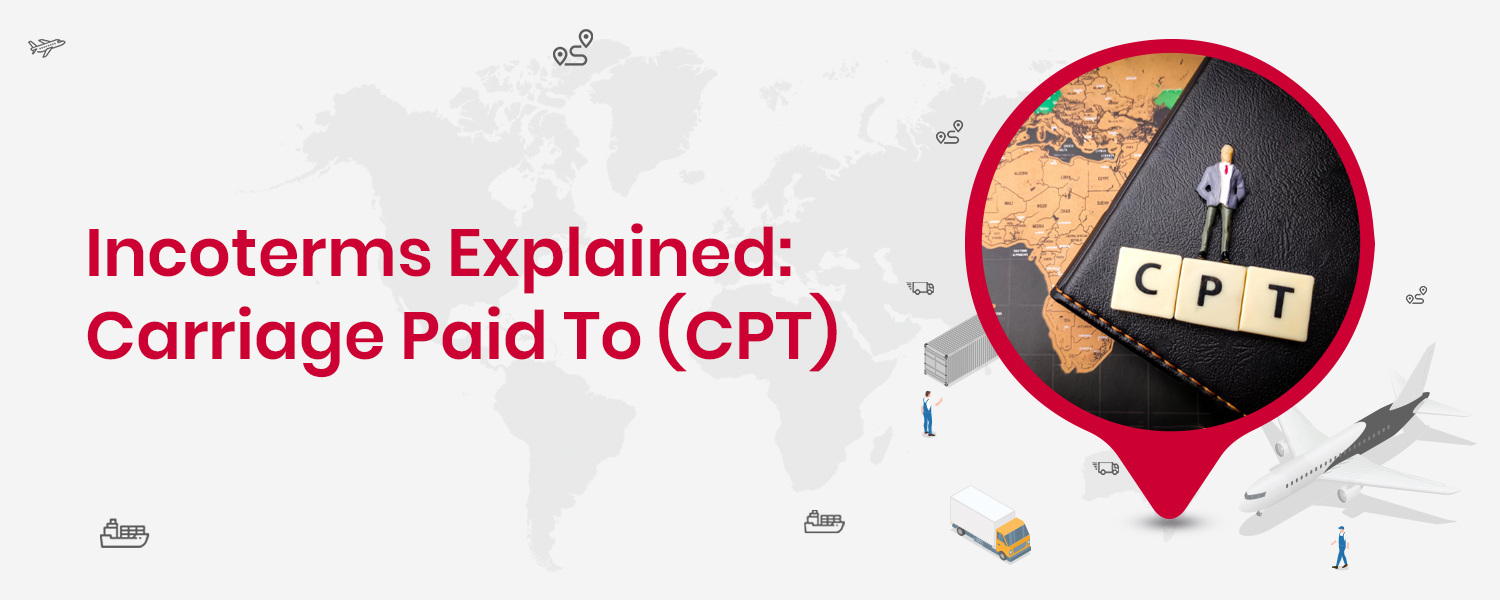In international trade, one of the terms, ‘Carriage Paid To,’ or CPT, emerges as a vital thread forming the backbone of countless eCommerce businesses. It ensures that each step, from packaging to order fulfilment, is executed flawlessly. Therefore, understanding the nuances of Carriage Paid To can be the difference between success and stagnation.
So, in this blog, let’s unpack the intricacies of CPT in international logistics. From understanding the meaning of CPT to knowing the roles of sellers and buyers, this blog aims to provide a comprehensive roadmap for eCommerce businesses navigating the global marketplace.
Understanding the meaning of Carriage Paid To (CPT) in Logistics?
CPT signifies that the seller bears the expenses and risks involved in transporting goods to a predetermined destination, one that’s typically outlined in the sales contract. This destination could be a shipping port, a warehouse, or any other agreed-upon location. Under CPT, the seller’s obligations encompass everything from ensuring proper export packaging to covering loading charges, handling origin terminal handling charges (OTHC), and managing the freight and destination terminal charges.
What are the Seller’s Responsibilities in the CPT Agreement?
Export Packaging
Export packaging is about adhering to stringent international standards that ensure the safety and durability of the products during transit. In CPT agreements, the seller must be diligent in selecting materials and methods that are tailored specifically to the type of goods and the chosen mode of transportation.
Loading Charges
The responsibility for loading charges under a CPT agreement is crucial for sellers. This involves covering the financial costs associated with loading the goods onto the transportation vehicle and ensuring seamless coordination with loading facilities.
Delivery to Port/Place
Here, the seller must exhibit their skills in selecting transportation services that are not only reliable but also cost-effective or use NimbusPost-like platforms for international courier recommendations. This step is about foresight and planning, ensuring the goods embark on their journey under the best conditions. The seller should also have an export-import code for cross-border trade.
Origin Terminal Handling Charges (OTHC)
Understanding and covering the Origin Terminal Handling Charges (OTHC) is a significant part of the seller’s responsibilities in CPT. This involves managing the costs that are incurred right at the shipping terminal at the point of origin.
Loading on Carriage
As we move forward to loading goods onto the carriage, the seller’s responsibilities encompass managing the related expenses and ensuring that the handling process is conducted without any damage to the goods.
Freight Charges
Determining and timely paying the freight forwarding charges is a critical responsibility under a CPT agreement. The seller must accurately calculate these charges based on weight, volume, and distance. Prompt payment of these charges ensures uninterrupted transit and adherence to delivery schedules.
Destination Terminal Handling Charges (DTHC)
In a CPT agreement, the seller handles the destination terminal handling charges (DTHC). This responsibility entails managing the charges at the terminal in the destination country.
Buyers’ Responsibilities in the CPT Agreement
Insurance
In a CPT agreement, the burden of ensuring the cargo’s safety after the handover point falls squarely on the buyer’s shoulders, making shipping insurance not just a mere option but a necessity. The buyer must go through many cargo insurance options, selecting a coverage type that aligns with the cargo’s value and inherent risk factors.
Delivery to Destination
Once the goods arrive at the destination port, the buyer’s responsibility is to manage the logistics from the port to the final destination. The buyer should meticulously plan and coordinate inland transportation, ensuring that the chosen logistics services align with the shipment’s requirements and the final delivery timelines.
Unloading at Destination
Unloading the goods at the destination encapsulates a thorough understanding of the costs associated with unloading, which includes hiring local handling services and ensuring efficient and damage-free unloading.
Import Duty, Taxes, and Customs Clearance
The buyer must be well-versed in the import duties and taxes applicable to the goods. This ensures that all financial obligations are met to facilitate a smooth entry into the destination country.
Conclusion
To optimise CPT for eCommerce supply chains, businesses must balance leveraging the benefits and mitigating the risks. This involves a deep understanding of the incoterm and an awareness of the broader logistics environment. Many small businesses do not have this privilege, so leveraging the expertise of logistics platforms like NimbusPost can be a smart move. NimbusPost allows businesses to avail of all the assets like reduced shipping cost, control over international shipping, freight transportation, real-time tracking, shipping cost calculator, and finding the best international courier services that align with your business goals.
FAQs
Which is better, CIP or CIF?
In CIP vs CIP, the answer depends on various factors. CIP is the better option for multi-modal transport requirements and greater buyer control. CIF is preferable for sea shipments where the seller desires more security in the logistics chain.
What is Carriage Insurance Paid To?
Carriage and Insurance Paid To (CIP) is an agreement where the seller is responsible for the cost of freight and insurance for goods up to an agreed-upon location.
Who pays for insurance in Incoterms?
Depending upon the actual incoterm used for each shipment, the seller or buyer bears insurance for the goods at somae point during transit.




